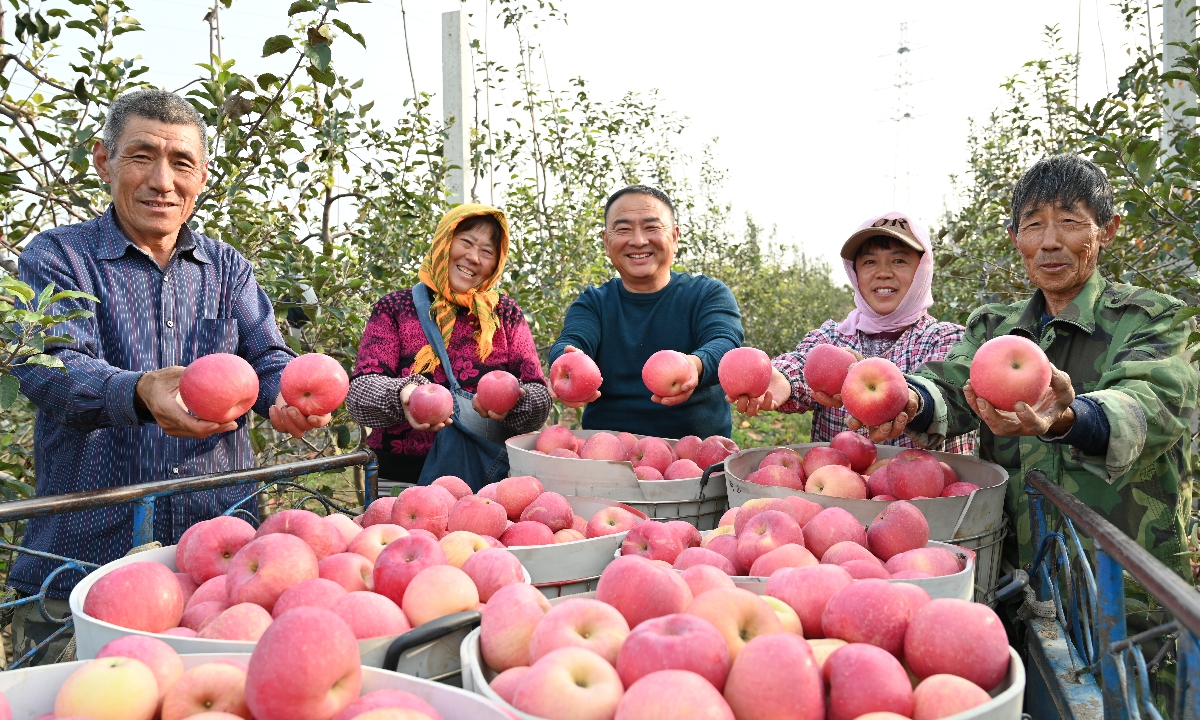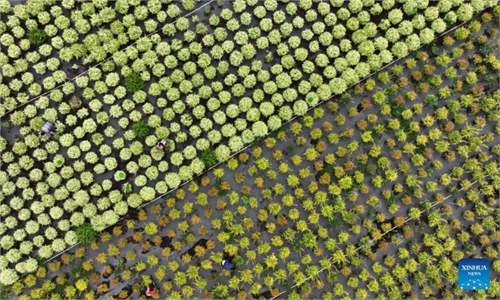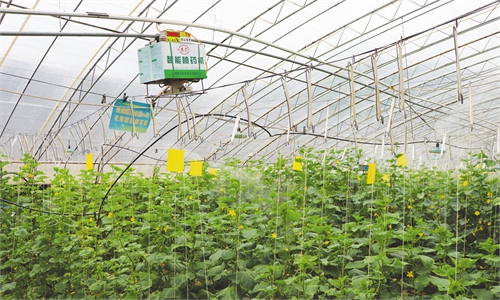SOURCE / PRESS RELEASE
Digitalization becomes a driver for rural revitalization in Qixia, E China’s Shandong Province

Farmers harvest apples in Qixia city, East China's Shandong Province. Photo: Courtesy of Qixia Bureau of Agriculture and Rural Affairs
As the "apple capital of China," Qixia city in East China's Shandong Province has more than 130 years of history of apple cultivation, with an area of nearly 1 million mu (66,666.7 hectares) of apple planting and an annual output of more than 2 million tons of produce.
Apple-planting industry has always been a major industry in Qixia to boost local incomes. Qixia apples are seeking new breakthroughs through digital planting and sales through e-commerce platforms to promote industrial transformation and upgrade.
Digital agriculture
The variety of "snow apples" in Qixia is well known among local residents and consumers nationwide. This type of apple is a late-maturing variety that is picked as the first snow falls and sold about two months later than apples in the normal picking season.
"The apples in our base have been ordered even before they fall from the trees due to their high sugar content and good taste," said Zhou Zhiyong, who is in charge of the production base for these "snow apples."
In Zhou's view, the high quality of the apple is attributed to the digital management of local orchards, in addition to the natural endowment.
The digital management refers to the devices distributed in the orchard including 12 soil measuring equipment, 12 monitoring devices and two meteorological instruments, which monitor the orchard's temperature, humidity and wind direction per day in a real-time manner.
According to the data transmitted by these devices, farmers can implement smart management via tailor-made cultivation and care programs for fruit trees.
The "snow apple" is a typical case of Qixia to promote the practice of digital agriculture. In the city, digitalization is changing the traditional mode of agricultural production, bringing a new model for rural industrial revitalization, and data has become a new tool to drive the high-quality development of local apples.
At present, digitized orchards that have been built or are under construction in the city have reached 5,000 mu in size.
In addition, some companies are also establishing information management platforms.
Through video surveillance, data collection and vehicle monitoring, the enterprises can manage all aspects from apple planting and transportation to processing and sales, with traceability specific to each plot of orchard and growers, which can realize data transparency and visualization.
Intelligent sales
During the apple harvest season, a large number of merchants from all over the country will flock to the auction center, which mainly carries out fruit trading for apples and cherries. It has an annual trading volume of 600,000 tons.
Unlike the traditional wholesale mode, the display screen in the trading hall shows the information of fruit in terms of variety and supplier code. Due to the transparency of apple quality, high-quality fruit can often be sold at a higher price here.
While consolidating offline trading, the city also focuses on sales via online platforms.
In addition to e-commerce and trading market, Qixia has also upgraded its cold chain and logistics services, in a bid to reduce the nutritional loss of apples in post-harvest and transportation.
At present, the city has more than 630 cold storage facilities, with an annual storage capacity of 1.2 million tons, which will strongly guarantee the year-round supply of apples.
Qixia is a representation of the country's digitalization development in rural revitalization. According to a report regarding the development of digital villages released by the Ministry of Agriculture and Rural Affairs in March 2023, all urban areas at county level had 5G coverage, and every village had enjoyed broadband access by the end of 2022.
Driven by increasingly convenient digital infrastructure, new types of agribusinesses continue to emerge, and rural e-commerce maintains its leading position as part of the rural digital economy. Latest statistics of the report show that national rural online retail sales reached 2.17 trillion yuan ($301.2 billion) in 2022.
With the help of digital technologies, the development of smart agriculture is accelerating in rural areas, according to the report, noting that the informatization rate of agricultural production increased to 25.4 percent in 2021.
This year, China will continue to promote the integration of digital technologies with rural revitalization.
The "No.1 central document" for 2023, the first policy statement released by the central authorities each year, outlined nine tasks from ensuring grain supply and bolstering high-quality rural industries, to increasing farmers' incomes and developing a beautiful countryside.
The official document noted that digital technologies will be more widely used in the countryside, and intelligent agriculture will also be promoted.



